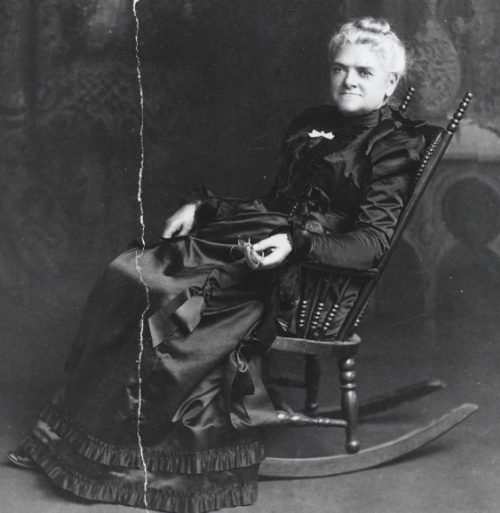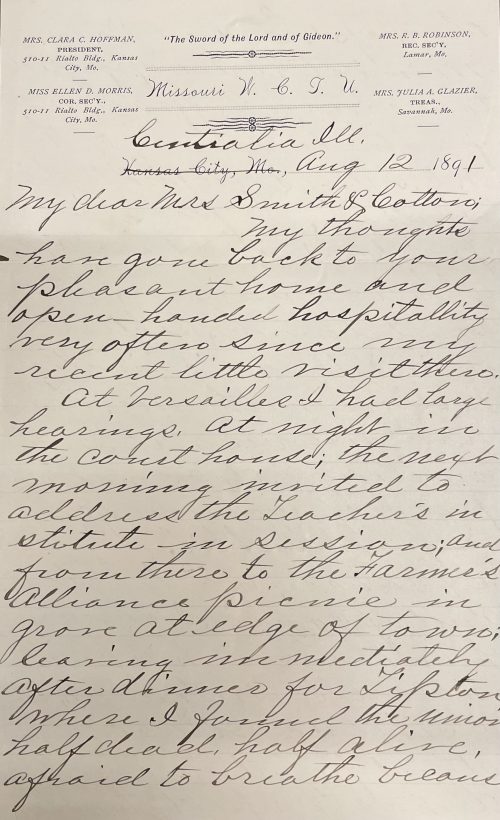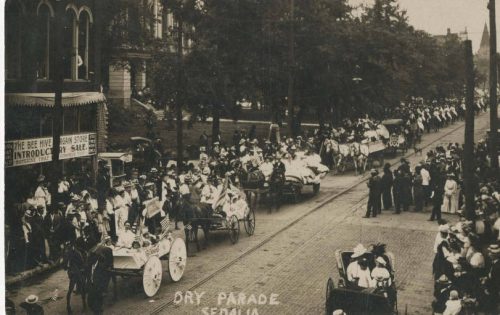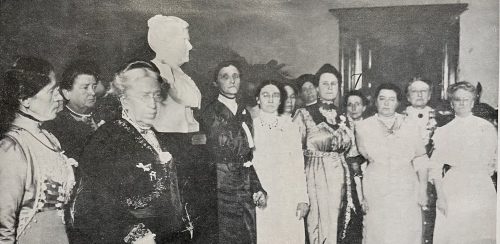![Hoffman Portrait Clara C. Hoffman, ca. 1900. [Nineteenth Annual Meeting of the Woman's Christian Temperance Union of the State of Missouri, 1901, p. 16a. SHS REF F537.1 W84 v. 19]](https://historicmissourians.shsmo.org/wp-content/uploads/2024/09/Hoffman-Portrait-300x350.jpg)
Clara C. Hoffman
Introduction
Clara C. Hoffman was an educator, suffragist, and social reformer from Kansas City. Hoffman served as president of the Woman’s Christian Temperance Union of Missouri for nearly twenty-five years and promoted causes such as temperance, women’s voting rights, better working conditions, and educational reform.
Early Life
Clara Cleghorn Hoffman was born on January 18, 1831, in De Kalb, New York, to Humphrey Cleghorn and Olive Burnham. Growing up on a farm in northern New York near the Canadian border, she noted later in life that her father had been an abolitionist who helped escaped slaves reach freedom on the Underground Railroad. She attended schools in New York and Massachusetts before moving with her family to Keokuk, Iowa.
After moving to Keokuk, she decided to dedicate her life to education. Teaching was one of the few professions in which women could work during the nineteenth century. At first she taught in Keokuk schools, but in 1861 she moved to Columbia, Illinois, to teach there. In Columbia, she met Goswin Hoffman, a German-born doctor. They married in 1861 and had two children, Harry and Guy. In 1869, the Hoffmans moved to Warrensburg, Missouri. Their time in Warrensburg was brief as two years later, in 1871, they moved to Kansas City. In Kansas City, Clara Hoffman worked as a schoolteacher, eventually becoming principal of Lathrop School, a position she held for ten years.
Woman's Christian Temperance Union
In 1882, Hoffman left Lathrop School to join the Woman’s Christian Temperance Union (WCTU). Founded in 1874, the organization, led by Frances Willard, took part in reform movements throughout the late nineteenth and early to mid-twentieth centuries, particularly women’s rights and temperance. Temperance was a social movement that urged people not to sell or drink alcohol, believing that it led to behavior that hurt families.
Devoted to a “Do Everything” policy promoted by Willard, WCTU members wore white ribbons to show their support for temperance and other social programs such as child welfare, women’s voting rights, better conditions for workers, more health care for women having children, and minimum wage laws. Hoffman was elected president of the Missouri WCTU, which was established in the state in the early 1880s.
As president from 1882 to 1901, she led the Missouri WCTU’s efforts to get the state to add a temperance amendment to its constitution and pass new laws regarding women’s voting rights and requiring that all children attend school. While these campaigns were unsuccessful at the time, the WCTU’s efforts did lead to laws regulating saloons and allowing counties and towns to vote on whether to ban alcohol. Later, in 1919, Missouri ratified two key amendments to the US Constitution: the Eighteenth Amendment, which outlawed alcohol, and the Nineteenth Amendment, which granted women the right to vote.
Missouri's "Great Heart"
Clara Hoffman’s quick rise to the top of the Missouri WCTU mirrored a similar movement through the national WCTU. During the late nineteenth century, she served as the group’s national secretary and worked closely with Frances Willard, as well as Willard’s successor, Lillian M. N. Stevens, to spread the organization around the globe. In 1895, she was appointed as a delegate to the World’s Convention of the WCTU in London.
Additionally, she was a popular speaker at WCTU events across the United Stares and even completed a lecture tour of Great Britain, France, Switzerland, and Germany. Her time on the lecture circuit and in close correspondence with high-ranking officials in the WCTU earned her the friendship of several prominent reformers of her day, including Susan B. Anthony, Mary T. Lathrop, and Lady Isabel Somerset. Hoffman’s dedication to the cause of temperance led Willard to refer to her as Missouri’s “Great Heart.”
In 1901, Hoffman decided not to run again as president. Nearing the age of seventy, her health had declined, and she had suffered the deaths of her husband in 1893 and her son Harry in 1896. However, her time away from the presidency was brief, as Hoffman returned to the office in 1903. Building upon the reform movements of the Progressive Era, the WCTU in Hoffman’s second time as president was one of many Progressive groups that lobbied the state legislature on behalf of proposed laws regulating alcohol, illegal drugs, child labor, and food. All of these bills passed in some form, including a state law that was later added to the national Pure Food and Drug Act of 1906, which prohibited the sale of unsafe food and medicine.
Legacy
Clara C. Hoffman championed the causes of temperance and women’s rights until the end of her life. Her friends noted that even as she was confined to her home due to illness, she still actively engaged with the WCTU. She reportedly worked at the desk in her home office for several hours on the date of her death. She passed away on February 13, 1908, at the age of seventy-seven, eleven years before her dreams came true that women would win the right to vote and alcohol would be banned.
Soon after her death, the Missouri WCTU proclaimed that its work for temperance and women’s voting rights would be dedicated to Hoffman’s memory. In 1913, at its thirty-first annual convention in Columbia, the organization commissioned a marble bust of Hoffman created by sculptor George Zolnay as “an inspiration to the young manhood and womanhood of the State.”
The bust was placed in Jesse Hall on the University of Missouri campus until the construction of a new library building in 1915. Since that time, it has remained in the collection of the State Historical Society of Missouri.
Text and research by Sean Rost
References and Resources
For more information about Clara C. Hoffman’s life and career, see the following resources:
Society Resources
The following is a selected list of books, articles, and manuscripts about Clara C. Hoffman in the research centers of The State Historical Society of Missouri. The Society’s call numbers follow the citations in brackets.
Articles from the Newspaper Collection
- “In Memory of Noted Temperance Leader.” University Missourian. October 2, 1913. p. 1.
- “Mrs. Clara C. Hoffman Dead.” Kansas City Times. February 14, 1908. p. 2.
- “The Prohibitionists.” St. Louis Globe-Democrat. February 22, 1892. p. 10.
- “They are Leaders.” St. Louis Post-Dispatch. February 14, 1892. p. 10.
- “Unveiling and Presentation of the Hoffman Bust to the University of Missouri.” The Missouri Counselor. October 1913. pp. 1-4.
- Bordin, Ruth. Woman and Temperance: The Quest for Power and Liberty, 1873-1900. Philadelphia: Temple University Press, 1981.
- Burger, Nelle G. ed. What Clara C. Hoffman Said. n.p., n.d. [REF F508.1 H675b]
- Butts-Runion, Blanche. Through the Years: A History of the First Seventy-Five Years of the Woman’s Christian Temperance Union of Missouri, 1882-1957. n.p., 1957. [REF F506 B984t]
- Carter-Stokes, Carrie Lee., ed. Clara C. Hoffman: Prophet and Pioneer. Kansas City: Leader Printing Company, n.d. [REF F501.1 H675c]
- Christensen, Lawrence O., William E. Foley, Gary R. Kremer, and Kenneth H. Winn. Dictionary of Missouri Biography. Columbia: University of Missouri Press, 1999. [REF F508 D561 c.2]
- “Contributors to Missouri Culture: Clara Cleghorn Hoffman.” Missouri Historical Review 94, no. 3 (April 2000), 365. [REF F550 M691]
- Dains, Mary K. Show Me Missouri Women: Selected Biographies. Kirksville: The Thomas Jefferson University Press, 1989. [REF F508 Sh82 v.1]
- Guitar, Sarah. “Monuments and Memorials in Missouri.” Missouri Historical Review 19, no. 4 (July 1925), 555-604. [REF F550 M691]
- Shoemaker, Floyd Calvin. Missouri’s Hall of Fame: Lives of Eminent Missourians. Columbia: The Missouri Book Company, 1918. [REF F508 Sh73 c.2]
- Woman’s Christian Temperance Union. The Missouri Counselor. [REF F537.1 M691 1911-1914]
- Woman’s Christian Temperance Union of the State of Missouri. Annual Report. [REF F537.1 W84 v.1-82, 1883-1964]
- Woman’s Christian Temperance Union of the State of Missouri. Program of the Annual Convention. [REF F537.1 W84p 1896, 1907, 1908, 1911, 1913]
- Clara C. Hoffman Notice, 1908 (C3210)
Notice of temperance and prohibition conference, called for Sedalia, MO, March 17, 1908, by state W.C.T.U. president. - Smith-Cotton Family Papers (C0399)
Papers of George R. Smith, a Missouri pioneer lawyer and politician, and his daughters, Sarah E. Cotton and Mrs. M E. Smith. The collection includes correspondence with Clara C. Hoffman. - Woman’s Christian Temperance Union (Columbia, MO.) Minute Book, 1884-1888 (C0262)
Book contains constitution and bylaws, minutes of meetings, roll of members, and activities of the organization.
Outside Resources
These links will take you outside the Society’s website. The Society is not responsible for the content of the following websites:
- Center for Women’s History and Leadership
This website is hosted by the Center for Women’s History and Leadership and features content related to Frances Willard and the Woman’s Christian Temperance Union. - Frances Willard House Museum
This website is hosted by the National Woman’s Christian Temperance Union and features information about the organization, Frances Willard House Museum, and National WCTU Library and Archives.






